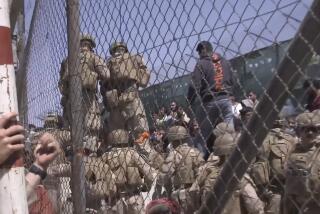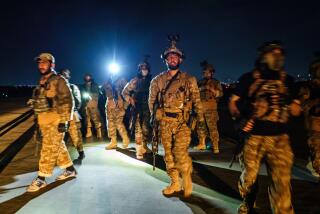Talks with Taliban ahead, now that U.S. envoys can find them
In one of the more bizarre diplomatic events of late, turbaned envoys of the Taliban cut a pink satin ribbon across the entrance of a two-story villa in Doha, Qatar, a fixed address where U.S. negotiators can find the fugitive extremists when they want to talk about peace for Afghanistan.
The ritual took place under the Taliban flag and a plaque proclaiming the office a mission of “The Islamic Emirate of Afghanistan.” Those were the symbols of statehood displayed by the Taliban during the five years they held tyrannical rule over Afghanistan and harbored Al Qaeda while it plotted the Sept. 11 attacks.
Afghan President Hamid Karzai erupted in anger over the militants’ attempt to present the office opened Tuesday as if it were an embassy. On Wednesday, he pulled his delegation out of talks with U.S. officials in Kabul aimed at working out security plans for the aftermath of the NATO withdrawal next year. He said his government would refuse to take part in the Doha negotiations and accused Washington of duplicity in allowing the Taliban to cloak itself in a mantle of legitimacy.
U.S. Secretary of State John F. Kerry initially hailed the new Taliban office as an opportunity to bring the Afghan combatants together to work toward a negotiated peace. After Karzai’s angry reaction, Kerry called the Afghan leader Wednesday to assure him the Taliban power symbols would be removed, the State Department reported. News agencies in the Qatari capital said Thursday that the flag emblazoned with Koranic script had been lowered out of sight and that the nameplate had been replaced with one that reads: “Political Office of the Taliban.”
The dust-up over the militants’ diplomatic overreach forced delay of the first U.S.-Taliban talks that were to have begun Thursday. But both sides indicated their interest in sitting down together soon, with talk of a possible prisoner exchange as a goodwill gesture.
Bowe Bergdahl, a U.S. Army sergeant from Idaho who went missing from his southeastern Afghanistan base four years ago, is the only known captive of the Taliban and is believed to be held in Pakistan. On Thursday, the Associated Press reported in the Pakistani capital, Islamabad, that Taliban spokesman Shaheen Suhail had conveyed in a telephone interview from Doha that the group was eager to exchange the American for five Taliban members imprisoned at the U.S. military detention facility at Guantanamo Bay, Cuba.
Suhail was quoted by the AP as saying the detainees issue had to be resolved first “to build bridges of confidence to go forward.”
The talk of a prisoner swap hasn’t been specific on names, and the Taliban presumably knows that the likes of confessed 9/11 mastermind Khalid Shaikh Mohammed, a Pakistani citizen, would never be considered in any release deal. But a few Afghan Taliban prisoners who don’t face formal terrorism charges have reportedly been mentioned as potential exchanges for Bergdahl.
Freeing suspects from Guantanamo may seem an unimaginable concession to Taliban extremists. But apparently such a swap is under consideration.
“I don’t think at this point the United States would bring Guantanamo releases to Pakistan or Afghanistan, but they might consider moving them to the [Persian] Gulf,” said Seth Jones, associate director of Rand Corp.’s International Security and Defense Policy Center and a former advisor to U.S. Special Forces in Afghanistan.
The Obama administration would surely face “pushback” from the public and politicians should it decide to exchange war-on-terrorism captives for Bergdahl, Jones said. But a State Department spokeswoman’s nondenial on the prospect seemed to indicate the White House may be willing to take some flak to resolve the protracted standoff over Bergdahl.
“We have not made a decision” about transfers from Guantanamo, spokeswoman Jen Psaki said. But the administration is expecting the Taliban to raise the issue, she added.
The Taliban clearly feel they have something to gain in engaging with the United States, Jones said, as it allows them to raise the prisoner issue and, with the diplomatic representation, “make themselves look like a legitimate organization that could run the country at some point.”
Sharad Joshi, a professor of nonproliferation and terrorism studies at the Monterey Institute of International Studies, agrees that the U.S.-Taliban talks are likely to take place soon but, like Jones, sees little prospect of any progress on the stated goal of negotiating a peace between the insurgents and the internationally recognized Afghan government under Karzai.
Failing to negotiate with the Taliban probably would encourage the militants to keep pressing their quest for control on the battlefield, Joshi said. Yet he is concerned that is likely to be the ultimate outcome of any Doha negotiations, given the animosity between the rival Afghan factions.
“At best, what we can hope for is that talks won’t break up in complete acrimony and they’ll agree to meet again at another date,” he said.
Stanford law professor Erik Jensen pointed out that the announcement of the Doha talks was greeted “almost simultaneously with a significant wave of violence across Afghanistan,” including the Taliban’s claim of responsibility for a rocket attack on the Bagram air base in which four Americans were killed.
“It demonstrates how extraordinarily fragmented the process is and will be,” said Jensen, who advises Stanford’s Afghanistan Legal Education Program and recently returned from a trip to the region.
He expects Karzai to get over his pique at the Taliban’s attempt to overstate its authority at the Doha talks. But like other analysts, he held out little hope of negotiating an end to Afghanistan’s intractable internal conflicts.
“Karzai’s scorn is not the greatest impediment to achieving a durable peace,” Jensen said. “ The real question is the extent to which the Taliban in Qatar represent factions across Afghanistan sufficiently to enter into binding commitments.”
ALSO:
Nigeria’s Boko Haram insurgents striking schools, farms
Egypt’s Morsi sparks anger with Islamist picks for top posts
Global Voices: An immigrant’s uphill push for a greener Greece
A foreign correspondent for 25 years, Carol J. Williams traveled to and reported from more than 80 countries in Europe, Asia, the Middle East and Latin America.
More to Read
Start your day right
Sign up for Essential California for news, features and recommendations from the L.A. Times and beyond in your inbox six days a week.
You may occasionally receive promotional content from the Los Angeles Times.







